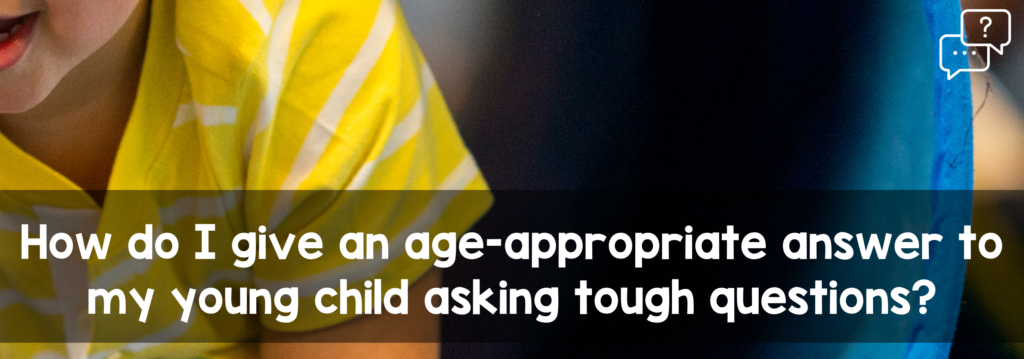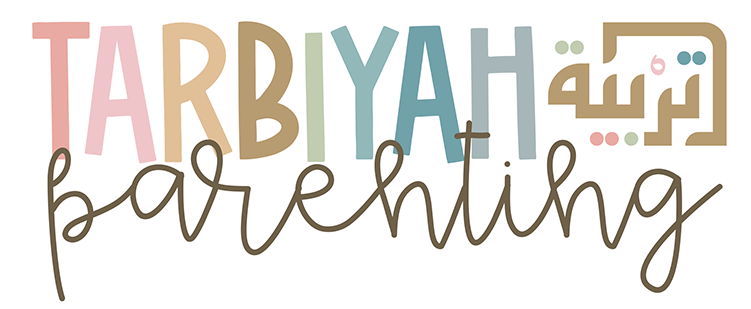How do I give an age-appropriate answer to my young child asking tough questions?

سم الله الرحمن الرحيم
Children are naturally curious and through their curiosity sometimes ask questions that stop us in our tracks. So how do we give age-appropriate answers to questions that seem to be beyond their years and that have us, at times, stumped?
Firstly, marvel in knowing that it’s a good sign of trust and safety that your preschooler or school-ager asks you anything that piques his or her interest. You’ll want to maintain their feelings of trust and safety by avoiding a response that shows your discomfort or intolerance for their question. The goal is to keep the doors of communication open throughout your child’s development, so that feeling of safety and trust is important to maintain, insha Allah. Avoid saying things that make a child feel bad for asking their uncommon questions:
- “Don’t ask that!”
- “What made you think of that?! That’s bad to say!”
Here are some things to keep in mind as you navigate answering your young child’s toughest questions.

“Masha Allah, that is such a good question!”
“I love that you asked me that!”
“Can you tell what made you want to know more about that?”
“Allahumma baarik! I love how your brain works. That is a very smart question to ask!“

“I’m hearing you say you want to know why people to die?”
“You want to know why music is haram?”
“Interesting, you’re wondering why you saw a Muslim sister with a dog at the park and we can’t have them as pets?”
“Oh, you’re curious about where babies come from?”

Instead of shying away from your child’s big question, focus on how you can provide a developmentally-appropriate response that will satiate his curiosity and that he can understand.
Decide whether the time and place are ideal to have a discussion; is it a conversation that requires you to be cozy on the couch or could it be had in the car ride home?
It’s important for you to be present and in the right state of mind to respond to your child. If you are feeling agitated or have other things on your mind, your response will reflect that.

For most children, a general answer often suffices without us needing to go into the nitty gritty of providing extensive rationale, logic, explaining the abstract, or presenting rulings.
“Allah places the baby in the mother’s womb to grow inside of her for 9 whole months!”
“Allah created us to worship Him. We are here for a set time and belong to Him. When a person dies it simply means they are returning back to Allah.”
“Because Allah created us to worship Him, we must try our best to do everything that He loves and stay away from everything He hates. Allah loves the Quran so we recite and listen to the Quran. Allah hates music so we hate it and don’t listen to it.”
Often, a child will ask follow-up questions to gain further clarity. When this happens, remember to “go wide” (instead of plunging into the deep end) by providing concrete details and examples that are relative to the child’s experience. This is since young children relate to the world through concrete and literal thinking. They haven’t fully grasped the abstract, the hypothetical, or multiple perspectives.

It’s important that children have a good foundation in Tawheed from a very young age. Through your child’s questioning, you can hold conversations where you’re discussing the Names and Attributes of Allah and giving them relatable examples for their age, life experience, and interests. The examples above, where the child’s asks questions about religion, are simple and return their curiosity about Islamic questions back to Tawheed.
This can also done in other worldly or natural situations. For example:
A child who is scared of the dark may be given a night light and taught how to make their dua before bed while being reminded that Allah is Al-Mu’min, the Granter of Security, and she should place her trust in Him for protection.
A child who receives a gift can be shown and taught how we show gratitude to Allah.
A child who is sick can be taught that Allah is Ash-Shaafee, The Healer, and how to supplicate to Him for a cure.

Lastly, don’t shy away from simply saying you don’t know something. This is a good display of humbleness that your child will learn to adopt. When this happens, be sure to follow up with how you will look for the answer or will discuss it at a later time.
“That’s a really good question, honey, and I’m not sure I have the answer for you right now. Let me think a bit more and we can talk about it tomorrow, OK?”
“Hmm, I don’t know the answer to that. Maybe we can ask your dad what he thinks.”
And Allah knows best.
